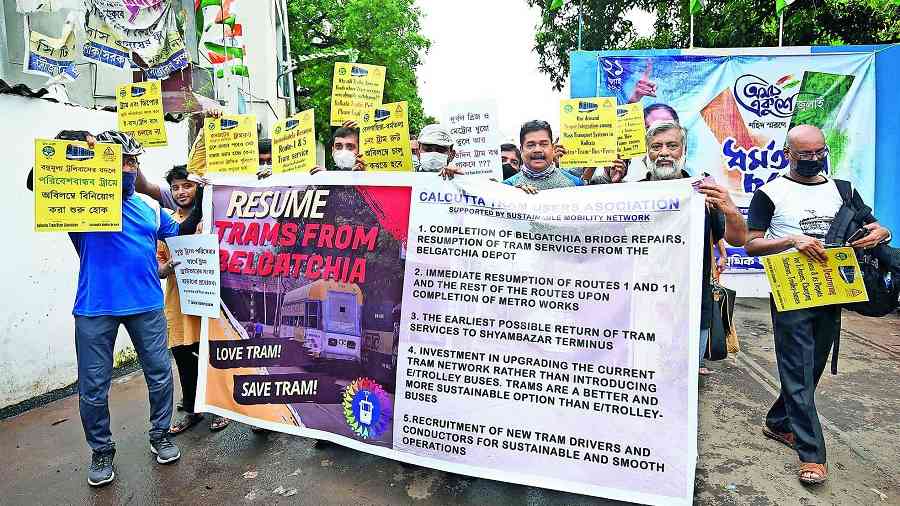A group of Kolkatans demonstrated outside the Belgachhia tram depot on Sunday demanding the state government reopen the tram routes from the depot once the Tallah bridge is ready.
They said they feared the government would not start the routes and would gradually kill all the routes from Belgachhia, Shyambazar and Bagbazar. The protesters cited the fact that the tram tracks on the Belgachhia bridge and also inside the depot were buried under a layer of bitumen to back their suspicion that the government actually wanted to scrap the routes.
“All this indicates the government may not be keen on running trams again from Belgachhia,” said Debasish Bhattacharyya, president of the Calcutta Tram Users Association (CTUA), a group of Calcuttans advocating for the environment-friendly mode of transport.
A senior official of the state transport department, however, told The Telegraph on Sunday that the state government was considering whether trams could be operated again from the Belgachhia depot.
“The matter is being discussed within the government. Senior officials are involved in the discussions. We are also talking to the police to seek their suggestions. No decision has yet been taken but I can say the government is looking at the matter in a positive way,” said the official.
Bhattacharyya said the Belgachia depot was the resting place for a large number of trams that ran through various roads of north Kolkata on their way to Esplanade, Dalhousie and Howrah, and back.
According to him, there were 25 operational tram routes in the city in 2015. That has come down to only two.
The two routes where trams still run are 24/29 (between Ballygunge and Tollygunge) and 25 (between Gariahat and Esplanade). The Gariahat-Esplanade route is not operational for a few days now because of track alignment work. Sagnik Gupta, another member of CTUA who took part in Sunday’s protest, said a large number of trams that were in running condition before the Belgachhia depot stopped being functional in 2018 have since become defunct. “Trams stopped running from the Belgachhia depot in 2018 because of track realignment work inside the depot,” said Gupta.
After the collapse of the Majerhat bridge in 2018, the government ordered a health audit of all flyovers and bridges and that led to further suspension of the service from the Belgachhia depot as all trams leaving or entering the depot had to ply over the Belgachhia bridge, Gupta said.
Then came the demolition of the Tallah bridge, following which the vehicle load on the Belgachhia bridge increased manifold, putting up more hurdles to the resumption of service from the depot, he said.
“We came to know about these developments after speaking to tram operators,” he said.
PWD officials said the reconstructed Tallah bridge is set to be opened towards the middle of September.
“We want to tell the government that they should resume tram service from the Belgachhia depot once the Tallah bridge is opened as traffic load on the Belgachhia bridge will then reduce again,” said Bhattacharyya.
Another protester said the government should also run trams at regular intervals so they become a reliable commute option. Officials in the transport corporation said 24 trams were running in Kolkata now and only about a hundred remain road-worthy.
